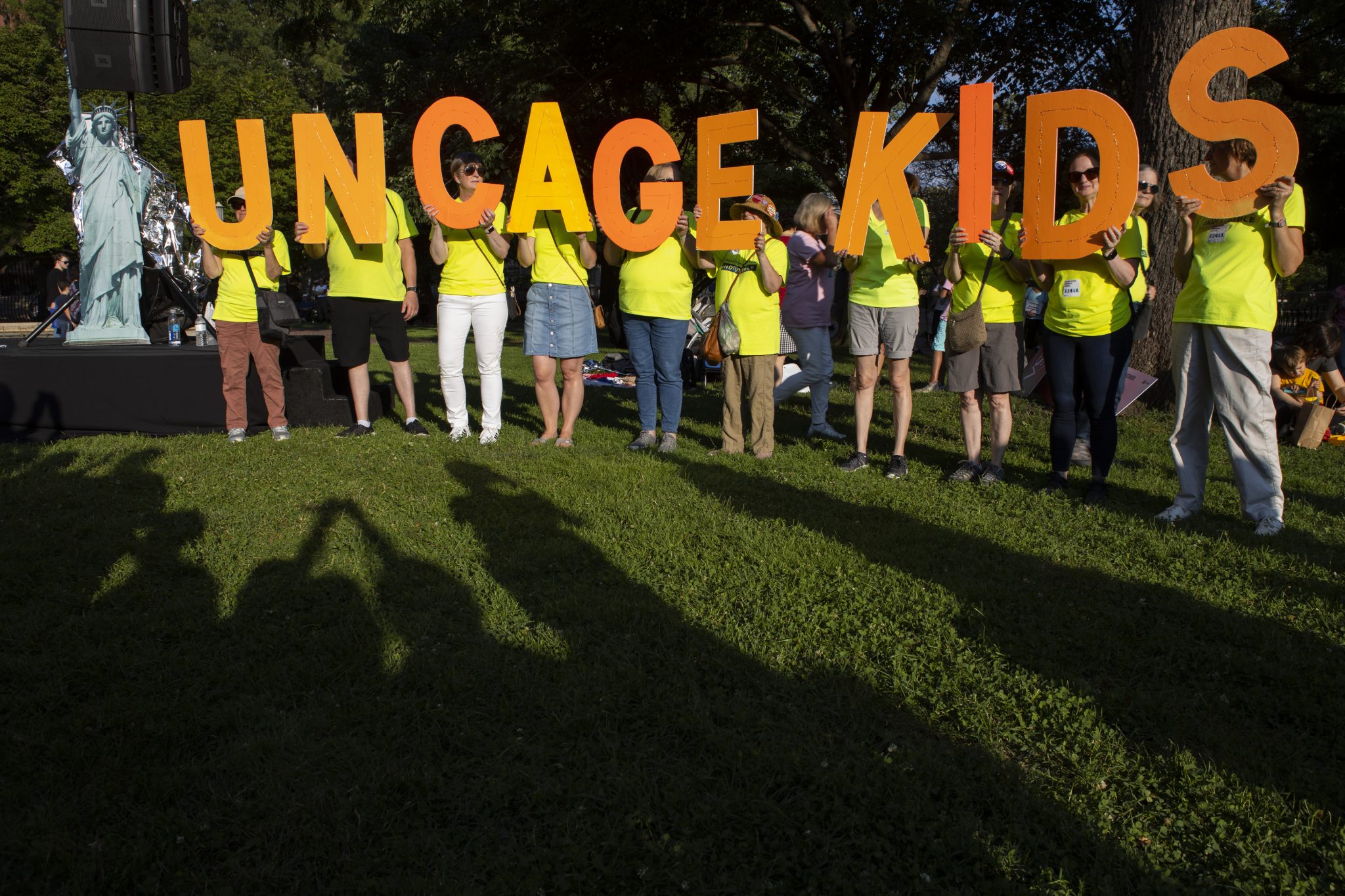

In this December 11, 2018 file photo, an asylum-seeking boy from Central America runs down a hallway after arriving from an immigration detention center to a shelter in San Diego. (AP Photo/Gregory Bull, File)
By Maria J. Ferrera, PhD
Images of volunteers giving gifts to migrant children at the border this past Christmas are yet another vivid reminder that there are still children living in detention centers who have been separated from their families. While a beautiful gesture, Christmas gifts alone won’t cut it. What will?
In the most recent Democratic debate, candidate Pete Buttigieg called for financial reparations for separated families at the border and a “fast track” to citizenship outlined by The Families Belong Together Act. Financial reparation helps, but it is aid of a temporary sort.
This past November, a federal judge in LA held the current administration accountable for their “deliberate indifference” and the severe psychological harm caused, handing down an unprecedented ruling requiring the government to compensate these families and provide mental health services. Although a step in the right direction, this ruling can be appealed. How we carry this ruling through will matter a great deal.
So what’s needed next?
We need to think very carefully about the extent and type of services and treatment these children and families require longer term to start to heal from the trauma they’ve experienced. We need a form of reparation that is comprehensive, compassionate, and lasting.
As a mental health practitioner and researcher who has focused on the mental health of immigrant youth and their families for over 20 years, I’ve been concerned with the lifelong, detrimental consequences of separation particularly as the duration of that separation stretches into a new year. Given the extent and duration of the trauma, a blueprint for comprehensive reparation is possible.
First and foremost, both financial and structural support need to be provided by the government to reunify the children who remain separated. It is not acceptable that it can take up to two years to reunify separated families. Competent human resources and adequate technologies are required to locate their parents or vet caregivers/sponsors who will provide a safe, secure, and stable home and an environment where they can thrive.
Dedicated professionals are already doing some of this work within well-established immigrant serving organizations and legal clinics, but they are overwhelmed by the need. These organizations desperately need funding and structural support to expand their services to provide community-level support, “know your rights” information, and legal representation for the thousands seeking asylum. Ongoing, long-term social and mental health services provided by (multilingual) practitioners trained in culturally-sensitive interventions and trauma-informed care, in addition to ongoing training for these and others working directly with the families is critical and in high demand.
Chicago-based practitioners, researchers and activists have galvanized around this demand. Interinstitutional, interdisciplinary groups like the Coalition for Immigrant Mental Health is disseminating critical resource information and training, while The Midwest Human Rights Consortium is responding to the need for a coordinated “workforce” of practitioners who can conduct medical and psychological forensic assessments necessary to advocate for immigrant children and families seeking asylum.


In this July 12, 2019 file photo, protesters hold up a sign during a rally in Lafayette Park near the White House where they were calling for and end to immigrant children’s detention and family separations. (AP Photo/Jon Elswick, File)
On a broader level, we need to urge Congress to pass the Families Belong Together Act, re-evaluate the power given to U.S. Customs and Border Protection (CBP), enact policies that protect the human rights of all immigrants entitled to due process, and protect all immigrant children from being separated from their families moving forward.
As a reminder: 3,000 children were separated at the Mexican border as a result of the “zero tolerance” policy enacted by the current administration in the Spring of 2018. Last November, the Department of Homeland Security Office of Inspector General (OIC) revealed that close to 1,300 additional children separated were not accurately recorded by the ill-equipped CBP. Although this policy has ended, CBP continues to have the authority to separate children from parents with criminal histories (often found as false allegations) and adults who are not legal guardians, including aunts, uncles and grandparents. Although 2,800 children have been reunified, it remains unclear if the remaining 1500 or so children have been reunified with their parents or caregivers.
And lest we also forget: Immigrant children as young as eight months old have been forcibly separated from their parent. Recent and longstanding studies have affirmed what we know—that separated children are at increased risk for depression and anxiety, attention deficit and hyperactivity, posttraumatic and attachment disorders. Couple this with exposure to violence in the child’s home country, the hardship faced trying to escape this violence, being forcibly separated from your primary caregiver, and then detained where the most basic needs (food, water, sanitation, warmth and physical safety) are not consistently met. According to the work of Jack Shonkoff, Director of the Center of Child Development at Harvard University, this accumulated, complex and toxic stress can lead to lifelong health problems.
As one of the first priorities of 2020, let’s fix this. And let’s never do it again.
***
Maria J. Ferrera is an Associate Professor at DePaul University, a Licensed Clinical Social Worker, Co-Chair of the Chicago based Coalition for Immigrant Mental Health, and Steering Committee Member of The Midwest Human Rights Consortium under the Illinois Chapter, American Academy of Pediatrics. She is a Public Voices Fellow with The OpEd Project.


